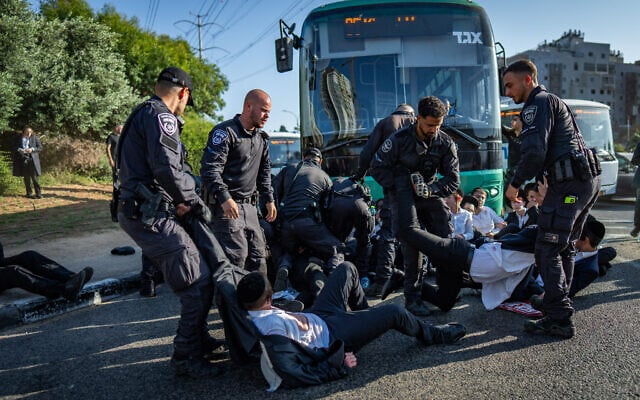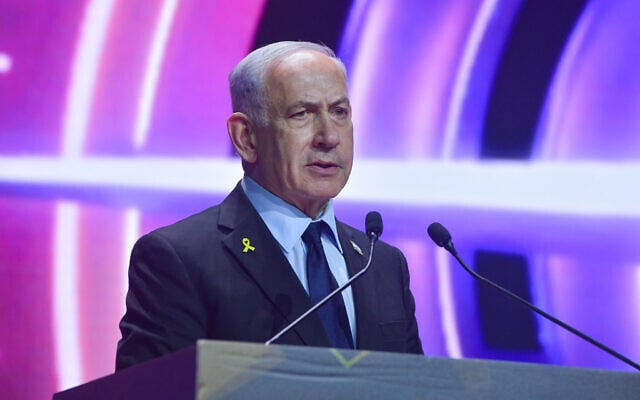



The war in the Gaza Strip is the central concern for the Israeli public looking ahead to the next election, according to a Thursday poll conducted for The Times of Israel, with a third (33%) of respondents saying it is their most significant consideration.
In terms of party politics, the coalition gained one mandate over the opposition, compared to last week, and would secure 54 seats to the opposition’s 56 — with Arab parties securing 10 — in the 120-seat Knesset, if the election were held today.
As such, Prime Minister Benjamin Netanyahu’s political bloc holds a potential “blocking majority” — not the ability to form a government, but the ability to stop any government from being formed, thus forcing a new election — unless the anti-Netanyahu bloc is willing to partner with an Arab party, such as the Islamist Ra’am, as former premier Naftali Bennett did during his term.
The poll, conducted on July 17, came as the war against Hamas in the Strip grinds on, despite attempts to reach a hostage release-ceasefire deal that would pause the fighting, at least temporarily, in exchange for the release of some of the 20 living captives still held by Hamas and some of the bodies of the other 30 hostages still in the terror group’s hands.
The next election is currently scheduled for October 2026, but could come earlier if the coalition falls apart or if the government calls an early election.
Just this week, Prime Minister Benjamin Netanyahu’s ultra-Orthodox allies left his government, threatening to deprive the coalition of its majority unless it passes a law to codify yeshiva students’ long-held exemption from mandatory service in the Israel Defense Forces.
That issue, of drafting ultra-Orthodox citizens to the military, is the top consideration for just over a fifth (22%) of Israelis, according to the Thursday poll.
In third place was the cost of living, with 19% of respondents saying this was the issue that would most influence their vote.
In fourth (12%) was the issue of governance and the role of unelected officials — what Netanyahu, echoing right-wing rhetoric abroad, has termed the “deep state,” as his government has been pushing for more political control of the civil service and the judiciary.
In fifth place, with a 10th (10%) of respondents, was the Iranian threat.
Israel’s 12-day war with the Islamic Republic last month — which Jerusalem launched in response to what it said was an imminent, existential threat posed by Iran’s nuclear and ballistic missile programs — is believed to have set back Tehran’s atomic program, but not finished it off altogether.
A report on Thursday said Israeli and US officials have discussed renewing strikes on several targeted nuclear facilities if Tehran tries to rebuild them or continues to avoid sitting down for negotiations.
Three percent of those surveyed did not answer the question.
The survey also asked respondents what party they would vote for if a general election were held today, yielding results consistent with previous polling, though suggesting a possible, slight increase in the performance of the current coalition parties.
All in all, the bloc representing the current coalition would win 54 seats, and the bloc representing the current opposition and its allies would win 56, with the remaining 10 seats going to Arab parties.
When Naftali Bennett and Yair Lapid formed a government in 2021, they included the Islamist Ra’am party — which, with its projected five seats, would give the current opposition bloc a majority this time around.
However, Bennett has said that if he were to win the premiership again, he would intend to include only Zionist parties, which presumably would exclude the Arab parties, as well as some ultra-Orthodox factions.
According to the poll, if elections were held today, Prime Minister Benjamin Netanyahu’s Likud party would win 30 seats, the most of any party.
Former premier Naftali Bennett’s party — currently going by the placeholder name ‘Naftali Bennett 2026’ — would win 26 seats.
The hawkish Yisrael Beytenu, led by Avigdor Liberman, would win 10.
Left-wing The Democrats, led by Yair Golan, would win 9.
The Sephardic ultra-Orthodox Shas party would win 8, and the Ashkenazi ultra-Orthodox party United Torah Judaism would win 7.
Center-left Yesh Atid, led by current Opposition Leader Yair Lapid, would win 7. Centrist Blue and White – National Unity, led by Benny Gantz, would win 4.
Far-right parties Otzma Yehudit, led by National Security Minister Itamar Ben Gvir, and Religious Zionism, led by Finance Minister Bezalel Smotrich, would win 5 seats and 4 seats, respectively.
Islamist Ra’am would win 5 seats. Hadash-Ta’al would also win 5. Balad would not cross the electoral threshold.
The Thursday poll was conducted by political consultant Yossi Tatika of “Tatika Research and Media.” It surveyed 404 Jewish and Arab respondents. The margin of error is 4.8%. It was broken down by age, religion, gender, and residential region in Israel.


